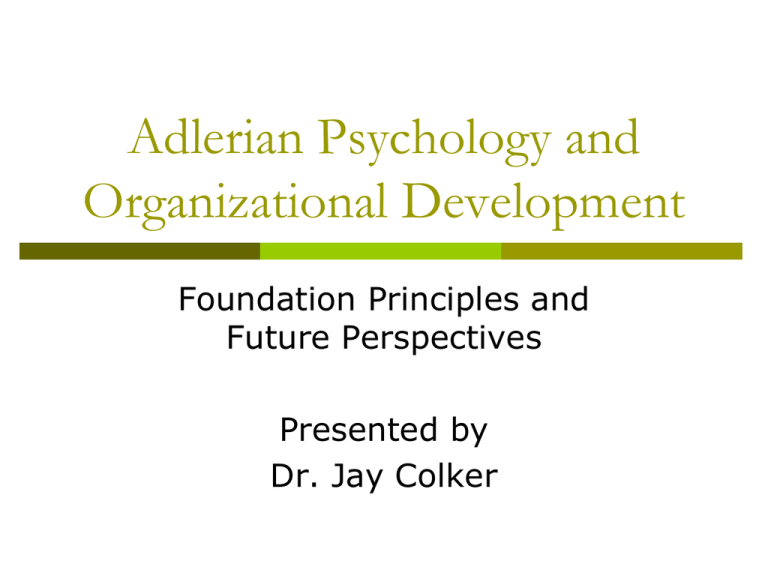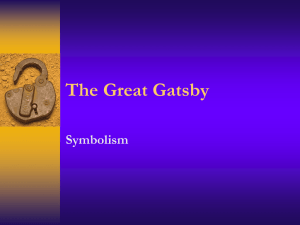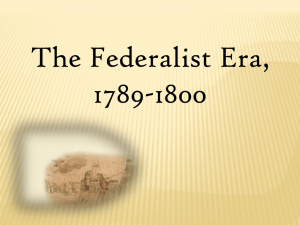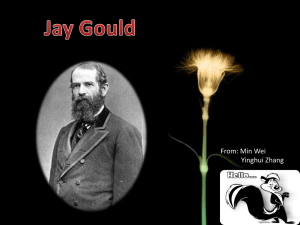Adlerian Psychology and Organizational Development PowerPoint
advertisement

Adlerian Psychology and Organizational Development Foundation Principles and Future Perspectives Presented by Dr. Jay Colker Outcome Objectives Enhance understanding of Adlerian principles View organizational development needs and concerns with an Adlerian lens Explore future OD strategies within a framework of change and innovative use of foundation principles Provide examples of recent work using Adlerian principles Copyright (c) 2013 Dr. Jay Colker Foundation Adlerian Principles Socially imbedded Self determining and creative Goal directed or teleological Growth model & striving for significance Holism Adler, 1958; Adler, 1969; Ansbacher & Ansbacher , 1956; Dreikurs, 1953; Dreikurs, 1971; Ferguson, 2010; Mosak, 1973; Mosak, 1977; Manaster & Corsini, 1995; Maniacci, 2006; Mosak & Maniacci, 1999; Shulman, 1973. Watts & Shulman, 2006 Copyright (c) 2013 Dr. Jay Colker Socially Embedded No one isolated; desire to belong; find a place of significance Ability to cooperate and contribute is a measure of social interest Well adjusted person behaves in line with needs of the situation Mal-adjusted person has faulty concepts of place in group, feelings of isolation and inferiority, and mistaken goals, which are compensation for these feelings Copyright (c) 2013 Dr. Jay Colker Self Determining and Creative Not heredity nor environment but own conclusions (soft determinism) Phenomenology/subjectivity, i.e. own interpretation of direct experiences Decisions are largely out of our awareness If self determined, they can change Optimistic Copyright (c) 2013 Dr. Jay Colker Growth Model & Striving for Significance All experience inferiority Felt minus to perceived plus Striving for significance Copyright (c) 2013 Dr. Jay Colker Goal Directed or Teleological Not pushed by causes but by our own dynamic striving towards our goals Some goals short term while others provide long term direction within life style Inherent purpose of behavior; psychology of use, not possession Classified as fictional or concrete Fictional support striving for significance Concrete are approaches to achieve goals Copyright (c) 2013 Dr. Jay Colker Holistic Mind, body, and emotions working together Lifestyle– a unifying principle Self concept, self ideal, view of world, view of others, final conclusion of place of significance Influences on life style Life Tasks – approach to tasks and perceived alignment to outside world Copyright (c) 2013 Dr. Jay Colker Factors Promoting Growth & Full Potential Belonging Contribution Equality Cooperation Other centered High empathy Freedom to choose Copyright (c) 2013 Dr. Jay Colker Factors Interfering with Growth & Full Potential Feeling alienated Not feeling able to contribute in a socially useful way Felt inferiority and less than Over concern with status, pride, prestige, i.e. self centered Compensatory striving often moves away from cooperation into more personal goals Copyright (c) 2013 Dr. Jay Colker Questions or Comments? Copyright (c) 2013 Dr. Jay Colker Adlerian Journal Focus on Organizations Review of last 12 years of organizational focused articles in Journal of Individual Psychology (JIP) Copyright (c) 2013 Dr. Jay Colker Belonging Contributions, social equality, and feelings of belonging are intimately connected (Ferguson, 2010) Well being of individual connected to well being of community (Ferguson, 2010); work is a natural extension of this concept Updated empirical evidence on the need to belong (Gere & MacDonald, 2010) Copyright (c) 2013 Dr. Jay Colker Feeling valued and significant Teslak (2010) connected feeling valued to workplace motivation Recognizing individual’s passions, interests, and values Flexible organizational structures Co-creating vision, collaboration, transparency Inclusion and shared decision making Enhancing social interest Copyright (c) 2013 Dr. Jay Colker Mutual Respect and Democratic Leadership (Ferguson, 2011) Ferguson noted that implementing mutual respect can enhance openness of communication and sensitivity to diverse perspectives. Ferguson also noted common themes of democratic leadership Shared decision making Problem solving with mutual respect Common sense rather than private logic Sharing responsibilities Copyright (c) 2013 Dr. Jay Colker Encouragement vs. Discouragement When people do not feel valued or appreciated by the organization, they disconnect (Ferguson, 2003) Encouragement and mutual respect enhance well being of organizations (Ferguson, 2006) Copyright (c) 2013 Dr. Jay Colker Work Effectiveness Cooperation replacing coercive methods (Ferguson, 2003) Shift from vertical plane to horizontal plane can be taught (Ferguson, 2007) Copyright (c) 2013 Dr. Jay Colker Collaborative Problem Solving Kummerow and Maguire (2010) highlighted fostering collaborative problem solving around concepts of social interest and belonging within MBTI framework Framework helped employees more readily accept differences Copyright (c) 2013 Dr. Jay Colker Adlerian Principles Critical to Organizations (Carlson, et.al., 2007) Empathy Equality Encouragement Education Empowerment Copyright (c) 2013 Dr. Jay Colker Coaching Page (2003) noted coaching practices aligned with Adlerian views Collaboration Trusting person Growth/action oriented Choice, responsibility, & accountability Stressing strengths Future orientation Life purpose Copyright (c) 2013 Dr. Jay Colker Additional focus areas Organizational intervention (Lemonides, 2007); holistic perspective; open systems theory; alignment with larger environment Effectiveness of organizational initiative, e.g. campus sustainability (Garner & Bruszewski, 2010); tied to significance and belonging Equal access to information Own personal values to specific effort Copyright (c) 2013 Dr. Jay Colker Additional focus areas Lifestyle Softness scale in BASIS-A inventory tied to transformational leadership (Frey, et. al, 2009) Organizational Life Style Analysis (Sperry & Carlson cited in Premo & Andrews, 2010) Fit between intentions and actions organization-wide Organizational concept, organizational ideal, environmental views, and ethical convictions Covers wide range of areas of assessment including values, climate, culture, vision, etc. Copyright (c) 2013 Dr. Jay Colker Questions or Comments? Copyright (c) 2013 Dr. Jay Colker Human Capital Development Purpose in organizations ensures optimal return on investment and achievement of organization’s objectives What are the major areas of focus that lead organizations to create strategic priorities and approaches to managing human capital? Copyright (c) 2013 Dr. Jay Colker Human Capital Areas of Focus Recruitment & selection On-boarding Goal alignment; culture, strategy, and role Performance management & reinforcement (reward systems) Diversity Team interaction Employee engagement Employee retention Copyright (c) 2013 Dr. Jay Colker Human Capital Areas of Focus Innovation Employee satisfaction Career development Health and wellness Work relations Leadership development Succession Change management Copyright (c) 2013 Dr. Jay Colker Remainder of Presentation Highlight approaches and philosophies in organizational development that reflect Adlerian perspectives Consider innovative next steps in organizational development Provide some recent examples of my work in organizations using Adlerian principles Copyright (c) 2013 Dr. Jay Colker OD & Adlerian Alignment Pink (2009) offers a compelling case for moving away from reward and punishment models in organizations Pink suggests three issues are critical to motivation autonomy , i.e. role of choice mastery , i.e. continually improving in something that matters purpose, i.e. the yearning to do what we do in the service of something larger than ourselves. Copyright (c) 2013 Dr. Jay Colker OD & Adlerian Alignment Generational differences (Dychtwald et al., 2006) Cultural alignment with personal values (Fancher, 2007) Personal values and beliefs of leaders become imbedded in culture, particularly founders Retention depends on alignment of culture, individual and organizational values, individual and organizational identities, and a dedication to common goals Copyright (c) 2013 Dr. Jay Colker OD & Adlerian Alignment Meyers et al. (2006) concepts of social identities and commitments Individual defines self in part through social identify which determines commitment Situational identity means association as long as one benefits Deep structure identity (p. 667) means changing self view to include views of all individuals Self concept includes a shared set of characteristics Copyright (c) 2013 Dr. Jay Colker OD & Adlerian Alignment Ambrose et al. (2008) discussed personorganization fit Alignment of moral development and ethical work climate Ethical values are shared beliefs of right ways to behave and how ethical issues are addressed Alignment of personal ethics with organization’s ethical values resulted in higher levels of commitment and job satisfaction and lower levels of intent to leave Copyright (c) 2013 Dr. Jay Colker OD & Adlerian Alignment Dunford (2002) discussed “institutional isomorphism” (p.57) which focuses on how rules, norms, and beliefs influence interactions Dunford also examined role of language on people’s thoughts about management Padaki (2000) noted consistent practices over time are organizational values and have an accompanying set of behaviors Copyright (c) 2013 Dr. Jay Colker OD & Adlerian Alignment Padaki noted importance of identifying core beliefs among relevant sample of people in organization and agreement on consistency of values (organizational life style?) Padaki also noted a “sectoral field” (p. 426) places certain expectation on an organization and thus, a grouping of similar values may exist in the field itself Copyright (c) 2013 Dr. Jay Colker Mental Models and System’s Thinking Individual beliefs are mental models (Jonassen et al., 2005; Senge, 2006) Individual beliefs or shared identity (Senge et al, 2004) Personality, environment, language, thought, meaning, and community are part of same system (Dent, 2003; Maani & Maharaj, 2004; Senge, 2003) Feedback in system has direct impact on what occurs within system (Bardoel & Haslett, 2004) Copyright (c) 2013 Dr. Jay Colker Mental Models and System’s Thinking Individual behavior and group behavior of same individuals may be quite different due to language and norms influencing individuals (Gureckis & Gladstone, 2006) Basu and Palazzo (2008) discussed “mental frames and sense making processes”; leader thinking translates into processes and perceptions Copyright (c) 2013 Dr. Jay Colker Mental Models and System’s Thinking Schreiber and Carley (2006) noted the intelligence of the collective is a competitive advantage Leaders who are working collectively at the intersection of information flows enhance the ability to adapt and learn Authors concluded, “participative-style leadership enables conditions that stimulate higher levels of human and social capital co-evolution” (p. 71) Copyright (c) 2013 Dr. Jay Colker Additional Perspectives Miles (2007) noted collaboration and information creation and sharing, based on trust, are critical components of innovation. Doz and Kosonen (2007) note when leaders have collective responsibility for results, the company becomes more strategically agile Copyright (c) 2013 Dr. Jay Colker Innovative Next Steps Seminal work of crowdsourcing (Howe, 2009) Tapping into networks (Bryan, et al., 2007) Role of technology and access to information Shared responsibility and ownership Group coaching Copyright (c) 2013 Dr. Jay Colker Example in International Manufacturing Company Design Crowdsourced CoachingTM Assumes collectively leaders know 80% or more about optimal leadership approaches Outcomes Sharing of best practices Recognition of not being alone Enhanced accountability to apply best practices Learning from other participants’ problems and approaches Network of support Copyright (c) 2013 Dr. Jay Colker Leadership Intervention Example Problem VP of Manufacturing old school authoritarian leader (in role 40 years) President and VP friends since high school President unwilling to manage the problem Solution Group accountability through succession council 1-1 interview data openly shared Council is driving shared responsibility and new expectations Copyright (c) 2013 Dr. Jay Colker Non-Profit Intervention Example Large non-profit (500 + employees) Currently substantial problems within the culture Top down management EEOC complaint High employee dissatisfaction Intervention: 2 questions How do we want to be treated? How do we want to treat others? Copyright (c) 2013 Dr. Jay Colker Summary Adlerian principles remain vibrant and relevant Adlerian views add value when examining organizational development needs and concerns Foundation principles may also offer an opportunity for innovation Copyright (c) 2013 Dr. Jay Colker References Adler, A. (1958). What life should mean to you. New York: G. P. Putnam’s Sons. Adler, A. (1969). The Science of Living. Garden City, NY: Anchor Books. Ansbacher, H. L., & Ansbacher, R. R. (1956). The individual psychology of Alfred Adler; a systematic presentation in selections from his writings (1st ed.). New York: Basic Books. Ambrose, M., Arnaud, A., & Schminke, M. (2008). Individual moral development and ethical climate: The influence of person-organization fit on job attitudes [Electronic version]. Journal of Business Ethics, 77(3), 323-333. Retrieved March 27, 2008, from EBSCOhost database. Bardoel, A. E., & Haslett, T. (2004). Success to the successful: The use of systems thinking tools in teaching OB [Electronic version]. Organization Management Journal, 1(2), 112-124. Retrieved April 28, 2007, from EBSCOhost database. Basu, K., & Palazzo, G. (2008). Corporate social responsibility: A process model of sensemaking [Electronic version]. Academy of Management Review, 33(1), 122-136. Retrieved March 27, 2008, from EBSCOhost database. Bryan, L.L., Matson, E.,, Weiss, L.M. (2007). Harnessing the power of informal employee networks. McKinsey Quarterly, 4, 44.55. Carlson, C., Clemmer, F., Jennings, T., Thompson, C-D., & Page, L.J. (2007). The Journal of Individual Psychology, 63, 424439. Dent, E. B. (2003). The interactional model: An alternative to the direct cause and effect construct for mutually causal organizational phenomena [Electronic version]. Foundations of Science, 8(3), 295-314. Retrieved May 5, 2007, from EBSCOhost database. Doz, Y. L., & Kosonen, M. (2007). The new deal at the top [Electronic version]. Harvard Business Review, 85(6), 98-104. Retrieved March 31, 2008, from EBSCOhost database. Dreikurs, R. (1953). Fundamentals of Adlerian Psycholgy. Chicago, IL: Alfred Adler Institute. Dreikurs, R. (1971). Social Equality: The Challenge of Today. Chicago, IL: Adler School of Professional Psychology. Dunford, R. (2002). Influence, institutional theory, and language: An analysis of popular management discourse on downsizing. In K. W. Parry & J. R. Meindl (Eds.), Grounding leadership theory and research (pp. 57-78). Greenwich, CT: Information Age. Dychtwald, K., Erickson, T. J., & Morison, R. (2006). Workforce crisis: how to beat the coming shortage of skills and talent. Boston, MA: Harvard Business School Press. Fancher, L. P. (2007). The influence of organizational culture on the implementation of succession planning [Electronic Copyright (c) March 2013 Dr. Colker version]. Atlanta: Georgia State University. Retrieved 27,Jay 2007, from ProQuest Dissertations and Theses database. References (continued) Ferguson, E.D. (2003). Work relationships, lifestyle, and mutual respect. The Journal of Individual Psychology, 59, 501-506. Ferguson, E.D. (2006). Work relations that enhance the well-being of organizations and individuals. The Journal of Individual Psychology, 62, 80-84. Ferguson, E.D. (2010). Adler’s innovative contributions regarding the need to belong. The Journal of Individual Psychology, 66, 1-7. Ferguson, E.D. (2011). What Adlerians consider important for communication and decision making in the workplace: Mutual respect and democratic leadership style. The Journal of Individual Psychology, 67(4), pp. 432-437. Frey, M., Kern, R.M., Snow, J. & Curlette, W. (2009). The Journal of Individual Psychology, 65, 212-240. Garner, N.E. & Bruszewski, R.V. (2010). Applying Individual Psychology to a university’s sustainability initiative. 66, 302314. Gere, J. & MacDonald, G (2010). An update of the empirical case for the need to belong. The Journal of Individual Psychology, 66, 93-115. Gureckis, T. M., & Gladstone, R. L. (2006). Thinking in groups [Electronic version]. Pragmatics & Cognition, 14(2), 293-311. Retrieved April 21, 2007, from EBSCOhost database. Howe, J. (2009). Crowdsourcing. New York: Three Rivers Press. Jonassen, D., Strobel, J., & Gottdenker, H. (2005). Model building for conceptual change [Electronic version]. Interactive Learning Environments, 13(1/2), 15-37. Retrieved April 22, 2007, from EBSCOhost database. Kummerow, J.M., & Maguire, M.J. Using the Meyers-Briggs Type Indicator framework with an Adlerian perspective to increase collaborative problem solving in an organization. The Journal of Individual Psychology, 66, 188-200. Lemonides, J.S. (2007). Towards an Adlerian approach to organizational intervention. The Journal of Individual Psychology, 63, 399-413. Maani, K. E., & Maharaj, V. (2004). Links between systems thinking and complex decision making [Electronic version]. System Dynamics Review, 20(1), 21-48. Retrieved April 21, 2007, from EBSCOhost database. Manaster, G.J. & Corsini, R.J. (1995). Individual Psychology: Theory and Practice. Itasca, IL: F.E. Peacock. Maniacci, M. P. (2006). A cognitive conundrum: Where's the thinking in cognitive? In R. E. Watts (Ed.), Adlerian, cognitive and constructivist therapies: An integrative dialog (pp. 107-121). New York: Springer. Copyright (c) 2013 Dr. Jay Colker References (continued) Meyers, J. P., Becker, T. E., & van Dick, R. (2006). Social identities and commitments at work: Towards an integrative model [Electronic version]. Journal of Organizational Behavior, 27(5), 665-683. Retrieved April 6, 2008, from EBSCOhost database. Miles, R. E. (2007). Innovation and leadership values [Electronic version]. California Management Review, 50(1), 192-201. Retrieved March 27, 2008, from EBSCOhost database. Mosak, H.H. (1973). Alfred Adler: His Influence on Psychology Today. New Jersey: Noyes Press. Mosak, H. H. (1977). Lifestyle. In H. H. Mosak (Ed.), On purpose: Collected papers (pp. 183-187). Chicago: Adler School of Professional Psychology. Mosak, H., & Maniacci, M. (1999). A primer of Adlerian psychology. New York, NY: Routledge. Padaki, V. (2000). Coming to grips with organizational values [Electronic version]. Development in Practice, 10(3-4), 420435. Retrieved August 26, 2006, from EBSCOhost database. Page, L.J. (2003). Adler and the profession of coaching. The Journal of Individual Psychology, 59, 86-93. Pink, D. H. (2009). Drive. New York: Riverhead Books. Premo, W. & Andrews, H.R. (2010). Organizational life style analysis tool. The Journal of Individual Psychology, 66, 482-491. Schreiber, C., & Carley, K. M. (2006). Leadership style as an enabler of organizational complex functioning [Electronic version]. Emergence: Complexity & Organization, 8(4), 61-76. Retrieved March 27, 2008, from EBSCOhost database. Senge, P. M. (2003). Creating desired futures in a global economy [Electronic version]. Reflections, 5(1), Teslak, A.G. (2010). “Buying in” and “checking out”: Motivation in the workplace. The Journal of Individual Pyschology, 66, 116129. Senge, P. M. (2006). Systems citizenship: The leadership mandate for this millennium [Electronic version]. Reflections, 7(3), 1-8. Retrieved April 28, 2007, from EBSCOhost database. Senge, P. M., Scharmer, O. C., Jaworski, J., & Flowers, B. S. (2004). Awakening faith in an alternative future [Electronic version]. Reflections, 5(7), 1-11. Retrieved April 28, 2007, from EBSCOhost database. Shulman, B.H. (1973). Contributions to Individual Psychology. Chicago: Alfred Adler Institute. Watts, R. E., & Shulman, B. H. (2006). Integrating Adlerian and constructive therapies: An Adlerian perspective. In R. E. Watts (Ed.), Adlerian, cognitive, and constructivist therapies: An integrative dialog (pp. 9-37). New York: Springer. Copyright (c) 2013 Dr. Jay Colker






